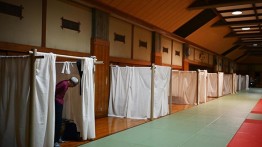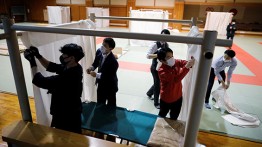Shigeru Ban Ar’84 Designs Temporary Shelters For Japan’s Homeless
POSTED ON: April 23, 2020
School of architecture alumnus Shigeru Ban, AR’84, has developed a design solution for members of Japan’s homeless population who can no longer rely on internet and comic (magna) cafes now shuttered due to the COVID-19 pandemic. These establishments, which previously operated 24 hours a day, 7 days a week, many of them offering shower facilities, had been a form of temporary housing for as many as 4,000 people in Tokyo alone. Originally conceived as places for late night working or temporary space for commuters unable to return to their homes at night, these cafes have, in more recent years, become shelters for those who cannot afford housing.
At a repurposed martial arts hall in Yokohama, Ban has designed temporary shelters that allow individual privacy and are spaced at safe distances to prevent Coronavirus spread. The individual structures are comprised of paper tube frames with cloth draping to enclose them. Residents sleep on either cardboard beds or cots. The Yokohama shelter has housed almost 40 individuals since opening on April 11.
Ban has previously designed numerous temporary structures to aid in disaster relief, including paper log houses and a paper church in Kobe, Japan in 1995; paper emergency shelters at the Byumba Refugee Camp in Rwanda in 1999; paper houses in India in 2001; the Hualin temporary elementary school in Chengdu, China in 2008; temporary container housing in Onagawa in 2011; and a cardboard cathedral in Christchurch, New Zealand in 2013.






